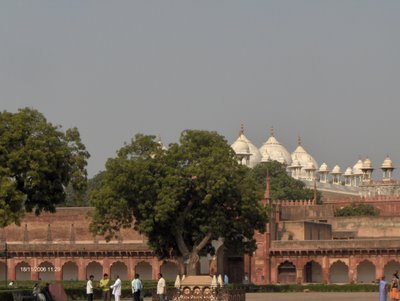
Dictionary: Mo·gul (mō'gəl, mō-gŭl') n. also Mo·ghul (mʊ-gŭl', mō-) or Mu·ghal (mū-gŭl')
- A member of the force that under Baber conquered India in 1526.
- A member of the Muslim dynasty founded by Baber that ruled India til 1857.
- A Mongol or Mongolian.
mogul A very rich or powerful person; a magnate.[Persian and Arabic muġul, from Mongolian Mo[ndot]gul.]
The Mughal Empire, (Persian: Gurkānī, which was also the self-designation of the Timurids in Central Asia and Khorasan) was an empire that at its greatest territorial extent ruled most of the Indian subcontinent, then known as Hindustan, and parts of what is now Afghanistan and the Balochistan
region.

In the early 16th century, Muslim armies consisting of Mongol, Turkic, Persian, and Afghan warriors invaded India under the leadership of the Timurid prince Zahir-ud-Din-Muhammad Babur. Babur was
the great-grandson of Central Asian conqueror Timur-e Lang (Timur the Lame, from which the Western name Tamerlane is derived), who had invaded India in 1398 before retiring to Samarkand who himself claimed descent from the Mongol ruler, Genghis Khan(Chinggis Khaan). Babur was driven
from Samarkand by the Uzbeks and initially established his rule in Kabul in 1504. It was established in 1526, enjoyed expansion and consolidation until about 1707 and survived, even if in drastically
attenuated form, until 1857. The empire was founded by the Timurid leader Babur in 1526, when he defeated Ibrahim Lodi, the last of the Delhi Sultans at the First Battle of Panipat.
Mughal is the Persian word for Mongol, and was generally used to refer to Central Asian nomads who
claimed descent from the Mongol warriors of Genghis Khan. The Mughal rulers were adherents of Islam.
The territory was largely conquered by the Pashtun Sher Shah Suri during the time of Humayun, the second Mughal ruler, but under Akbar the Great it grew considerably, and continued to grow until the
end of Aurangzeb's rule. Jahangir, the son of Mughal Emperor Akbar and Rajput princess Mariam-uz-Zamani, ruled the empire from 1605–1627. In October 1627, Shah Jahan, the son of Mughal Emperor Jahangir and Rajput princess Manmati, succeeded to the throne, where he inherited a vast
and rich empire in India; and at mid-century this was perhaps the greatest empire in the world.
Shah Jahan commissioned the famous Taj Mahal (between 1630–1653), in Agra as a tomb for his wife Mumtaz Mahal, who died giving birth to their 14th child.

By 1710, the empire had reached its zenith with a territory spanning over 750 million acres.
Babur, a seasoned military commander, entered India in 1526 with his well-trained veteran army of 12,000 to meet the sultan's huge but unwieldy and disunited force of more than 100,000 men. Babur defeated the Lodhi sultan decisively at the first Battle of Panipat. Employing gun carts, moveable
artillery, superior cavalry tactics, and the highly regarded Mughal composite bow, a weapon even more powerful than the English longbow of the same period. Babur achieved a resounding victory and the Sultan was killed. A year later (1527) he decisively defeated, at the Battle of Khanwa, a Rajput
confederacy led by Rana Pratap Singh of Chittor. A third major battle was fought in 1529 when, at the battle of Gogra, Babur routed the joint forces of Afghans and the sultan of Bengal. Babur died in 1530
at Agra before he could consolidate his military gains. During his short five-year reign, Babur took considerable interest in erecting buildings, though few have survived. He left behind as his chief legacy a set of descendants who would fulfill his dream of establishing an empire in the Indian
subcontinent.
According to the document available in the State Library of Bhopal, Babur left the following will to Humayun: 
"My son take note of the following: Do not harbour religious prejudice in your heart. You should
dispense justice while taking note of the people's religious sensitivities, and rites. Avoid slaughtering
cows in order that you could gain a place in the heart of natives. This will take you nearer to the
people.
Do not demolish or damage places of worship of any faith and dispense full justice to all to ensure
peace in the country. Islam can better be preached by the sword of love and affection, rather than the
sword of tyranny and persecution. Avoid the differences between the shias and sunnis. Look at the
various characteristics of your people just as characteristics of various seasons."

